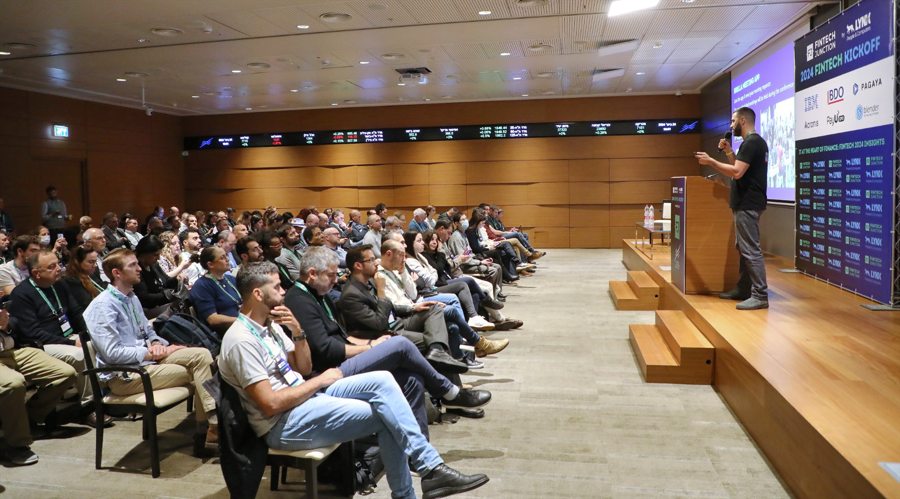
Soon after October 7th, Israeli tech was split between “no, everything is not ok” and “we deliver NO MATTER WHAT.” While the end of the war is nowhere in sight, and in fact it’s more likely to spiral into a wider regional conflict (spiraling into a regional conflict is a more likely scenario), things seem to morph into some sort of a “new normal.”
That, at least, was the sentiment at the recent Fintech Junction 2024, an Israeli tech conference held on Wednesday at the Tel Aviv Stock Exchange.
Ben Pelled of Lynx Events
Speaking as the event wrapped up, Ben Pelled of Lynx Events, the conference organizers, was unreservedly enthusiastic: “In these tough times in Israel, fintech cast a blinding light of possibility. This conference wasn't just about business, it was about people, collaboration, and building a brighter financial future for all.”
Gathering over 250 attendees from the local fintech industry, the event brought together unicorns like Pagaya and Melio, banks, and startups at various levels of stealth and fundraising rounds.
Conversation both on and off stage revolved around fintech’s current state of maturation, traditional and generative AI (and what each can and cannot do in financial services), and, naturally, adapting to the constant disruption brought about by the war.
A Fintech Tipping Point
A decade since entering the financial conversation, fintech’s mission seems to be finally shifting from disruption to collaboration.
“In 2013, [banks] thought 'I’m building to sell and do an exit'; then they thought 'I’m planning an IPO.' Now there seems to be a better understanding of the role fintechs play,” said Gal Aviv, the Founder and CEO of Blender.
His fireside chat with Or Kaplinsky from Amdocs, who shared pain points from his experience propping up a banking startup, touched upon the upside for startups.
“Fintechs, on the other hand, need vast funding to handle vast data, and can’t handle so easily integrations with the IT departments in banks,” Aviv said.
The opportunities they recognized for fintech firms lie precisely in this gap, between core banking and cutting-edge. Lean and mean startups are “the middle layer of stuff like operations, compliance, and operations,” according to Aviv.
Nothing to Generate Yet?
Another big topic was, quite obviously, generative AI and its applications in financial services. Showcasing the capabilities of IBM’s WatsonX, Tal Schahar, the tech veteran's World Wide Data & AI Delivery Leader, pinpointed the importance of tailored training of LLMs for the needs of financial services.
Tal Schahar, Senior Product Manager Fraud and Identity, IBM Security Trusteer.
"GPT is great for generating poems and homework," he said. "But it can't cover everything."
A later panel echoed this opinion, parceling out the challenges in implementing generative AI in dealing with sensitive data.
"In hard-core payments and fintech, at the moment there is not much to generate," said Shiri Schnieder, the CTO at PayU.
GenAI can be particularly useful in improving efficiency, especially within development team
Shiri Schneider, CTO of PayU (LinkedIn).
"It is not suitable for every developer, though," Schiender said, highlighting that senior staff members should have a better understanding of how to deal with LLMs' shenanigans.
If a fully-fledged generative AI is the future of payments, the present is dominated by a more traditional iteration: Machine learning.
Schneider presented two notable use cases: increasing transaction approval rates, and detecting broader anomalies. While the former is focused on choosing the best pathway within the processing ecosystem, the latter can help firms with breaches of behavioural patterns.
While today is certainly a challenge, and the road ahead seems uncertain, the future is promising and, despite all the uncertainty, Schahar got it right when he said: “In finance, yesterday's buzz is today's reality."
Participate in Our Fraud Survey: Your Opinion Matters!
We invite you to participate in our joint survey conducted by FXStreet and Finance Magnates Group, which explores prevalent online financial fraud types, platforms used for fraudulent activities, effectiveness of countermeasures, and challenges faced by companies in tackling such fraud. Your valuable insights will help inform future strategies and resource allocation in combating financial fraud.
Social Media Scams: Help Shape the Fight with Your 2024 Survey Participation
Soon after October 7th, Israeli tech was split between “no, everything is not ok” and “we deliver NO MATTER WHAT.” While the end of the war is nowhere in sight, and in fact it’s more likely to spiral into a wider regional conflict (spiraling into a regional conflict is a more likely scenario), things seem to morph into some sort of a “new normal.”
That, at least, was the sentiment at the recent Fintech Junction 2024, an Israeli tech conference held on Wednesday at the Tel Aviv Stock Exchange.
Ben Pelled of Lynx Events
Speaking as the event wrapped up, Ben Pelled of Lynx Events, the conference organizers, was unreservedly enthusiastic: “In these tough times in Israel, fintech cast a blinding light of possibility. This conference wasn't just about business, it was about people, collaboration, and building a brighter financial future for all.”
Gathering over 250 attendees from the local fintech industry, the event brought together unicorns like Pagaya and Melio, banks, and startups at various levels of stealth and fundraising rounds.
Conversation both on and off stage revolved around fintech’s current state of maturation, traditional and generative AI (and what each can and cannot do in financial services), and, naturally, adapting to the constant disruption brought about by the war.
A Fintech Tipping Point
A decade since entering the financial conversation, fintech’s mission seems to be finally shifting from disruption to collaboration.
“In 2013, [banks] thought 'I’m building to sell and do an exit'; then they thought 'I’m planning an IPO.' Now there seems to be a better understanding of the role fintechs play,” said Gal Aviv, the Founder and CEO of Blender.
His fireside chat with Or Kaplinsky from Amdocs, who shared pain points from his experience propping up a banking startup, touched upon the upside for startups.
“Fintechs, on the other hand, need vast funding to handle vast data, and can’t handle so easily integrations with the IT departments in banks,” Aviv said.
The opportunities they recognized for fintech firms lie precisely in this gap, between core banking and cutting-edge. Lean and mean startups are “the middle layer of stuff like operations, compliance, and operations,” according to Aviv.
Nothing to Generate Yet?
Another big topic was, quite obviously, generative AI and its applications in financial services. Showcasing the capabilities of IBM’s WatsonX, Tal Schahar, the tech veteran's World Wide Data & AI Delivery Leader, pinpointed the importance of tailored training of LLMs for the needs of financial services.
Tal Schahar, Senior Product Manager Fraud and Identity, IBM Security Trusteer.
"GPT is great for generating poems and homework," he said. "But it can't cover everything."
A later panel echoed this opinion, parceling out the challenges in implementing generative AI in dealing with sensitive data.
"In hard-core payments and fintech, at the moment there is not much to generate," said Shiri Schnieder, the CTO at PayU.
GenAI can be particularly useful in improving efficiency, especially within development team
Shiri Schneider, CTO of PayU (LinkedIn).
"It is not suitable for every developer, though," Schiender said, highlighting that senior staff members should have a better understanding of how to deal with LLMs' shenanigans.
If a fully-fledged generative AI is the future of payments, the present is dominated by a more traditional iteration: Machine learning.
Schneider presented two notable use cases: increasing transaction approval rates, and detecting broader anomalies. While the former is focused on choosing the best pathway within the processing ecosystem, the latter can help firms with breaches of behavioural patterns.
While today is certainly a challenge, and the road ahead seems uncertain, the future is promising and, despite all the uncertainty, Schahar got it right when he said: “In finance, yesterday's buzz is today's reality."
Participate in Our Fraud Survey: Your Opinion Matters!
We invite you to participate in our joint survey conducted by FXStreet and Finance Magnates Group, which explores prevalent online financial fraud types, platforms used for fraudulent activities, effectiveness of countermeasures, and challenges faced by companies in tackling such fraud. Your valuable insights will help inform future strategies and resource allocation in combating financial fraud.
Social Media Scams: Help Shape the Fight with Your 2024 Survey Participation
- SEO Powered Content & PR Distribution. Get Amplified Today.
- PlatoData.Network Vertical Generative Ai. Empower Yourself. Access Here.
- PlatoAiStream. Web3 Intelligence. Knowledge Amplified. Access Here.
- PlatoESG. Carbon, CleanTech, Energy, Environment, Solar, Waste Management. Access Here.
- PlatoHealth. Biotech and Clinical Trials Intelligence. Access Here.
- Source: https://www.financemagnates.com//fintech/payments/what-ai-cant-generate-and-how-israeli-tech-stays-strong/
- :is
- :not
- $UP
- 2013
- 2024
- 250
- 26
- 27
- 7th
- a
- About
- According
- activities
- After
- ahead
- AI
- All
- allocation
- an
- and
- applications
- approval
- ARE
- around
- AS
- At
- attendees
- aviv
- Banking
- Banks
- banner
- BE
- behavioural
- ben
- BEST
- Better
- between
- Big
- Blender
- both
- breaches
- brighter
- broader
- brought
- Building
- business
- but
- by
- CAN
- cannot
- capabilities
- cases
- ceo
- certainly
- challenge
- challenges
- chat
- choosing
- collaboration
- combating
- Companies
- compliance
- conducted
- Conference
- conflict
- constant
- Conversation
- Core
- Core Banking
- cover
- CTO
- Current
- Current state
- cutting-edge
- data
- deal
- dealing
- decade
- deliver
- delivery
- departments
- Despite
- Developer
- Development
- Disruption
- do
- dominated
- each
- easily
- echoed
- ecosystem
- effectiveness
- efficiency
- end
- entering
- enthusiastic
- especially
- Ether (ETH)
- Event
- events
- Every
- everything
- exchange
- Exit
- experience
- explores
- faced
- fact
- fight
- Finally
- finance
- Finance Magnates
- financial
- financial fraud
- financial services
- fintech
- fintechs
- Fireside Chat
- firms
- focused
- For
- For Startups
- Former
- founder
- Founder and CEO
- fraud
- fraudulent
- from
- funding
- Fundraising
- future
- GAL
- gap
- generate
- generating
- generative
- Generative AI
- got
- great
- Group
- hand
- handle
- Have
- he
- Held
- help
- highlighting
- his
- homework
- How
- How To
- HTTPS
- IBM
- Identity
- implementing
- importance
- improving
- in
- increasing
- industry
- inform
- insights
- integrations
- into
- invite
- IPO
- Israel
- Israeli
- IT
- iteration
- ITS
- joint
- jpg
- just
- later
- layer
- leader
- learning
- least
- levels
- lie
- light
- like
- likely
- local
- lynx
- machine
- manager
- Matter
- mean
- Media
- Members
- Middle
- Mission
- moment
- more
- much
- Need
- needs
- no
- normal
- notable
- now
- october
- of
- off
- on
- online
- Operations
- Opinion
- opportunities
- or
- organizers
- Other
- our
- out
- over
- Pagaya
- Pain
- Pain points
- panel
- participate
- particularly
- pathway
- patterns
- PayU
- People
- planning
- Platforms
- plato
- Plato Data Intelligence
- PlatoData
- Play
- points
- possibility
- precisely
- present
- presented
- prevalent
- processing
- Product
- product manager
- promising
- quite
- Rates
- Reality
- recent
- recognized
- regional
- resource
- revolved
- right
- road
- Role
- rounds
- s
- Said
- scams
- scenario
- security
- seem
- seems
- sell
- senior
- sensitive
- sentiment
- Services
- Shape
- shared
- SHIFTING
- should
- showcasing
- Sight
- since
- So
- some
- split
- Staff
- Stage
- startup
- Startups
- State
- Stealth
- stock
- strategies
- strong
- such
- suitable
- Survey
- T
- tackling
- tailored
- tech
- Tel
- Tel Aviv
- that
- The
- The Future
- then
- There.
- These
- they
- things
- this
- though?
- thought
- times
- Tipping
- to
- today
- together
- topic
- touched
- tough
- traditional
- Training
- transaction
- two
- types
- Uncertain
- Uncertainty
- understanding
- unicorns
- upon
- Upside
- use
- used
- useful
- Valuable
- various
- Vast
- veteran
- war
- was
- wasn
- Wednesday
- What
- when
- which
- while
- WHO
- wide
- wider
- will
- with
- within
- world
- Wrapped
- yesterday
- yet
- you
- Your
- zephyrnet






